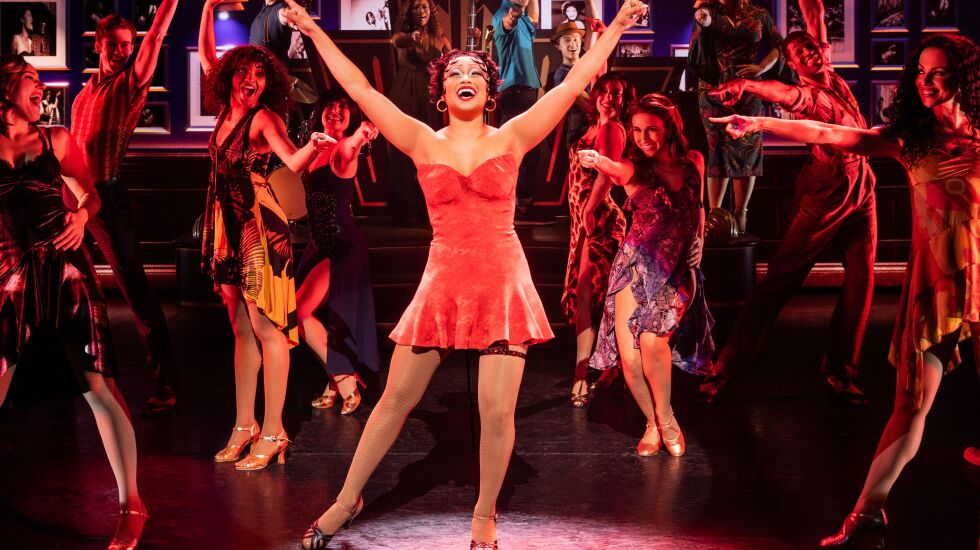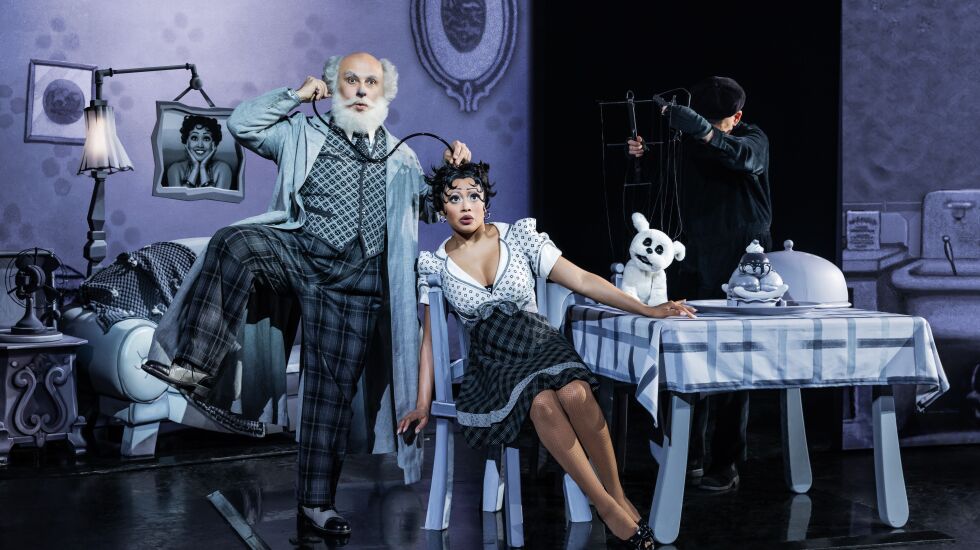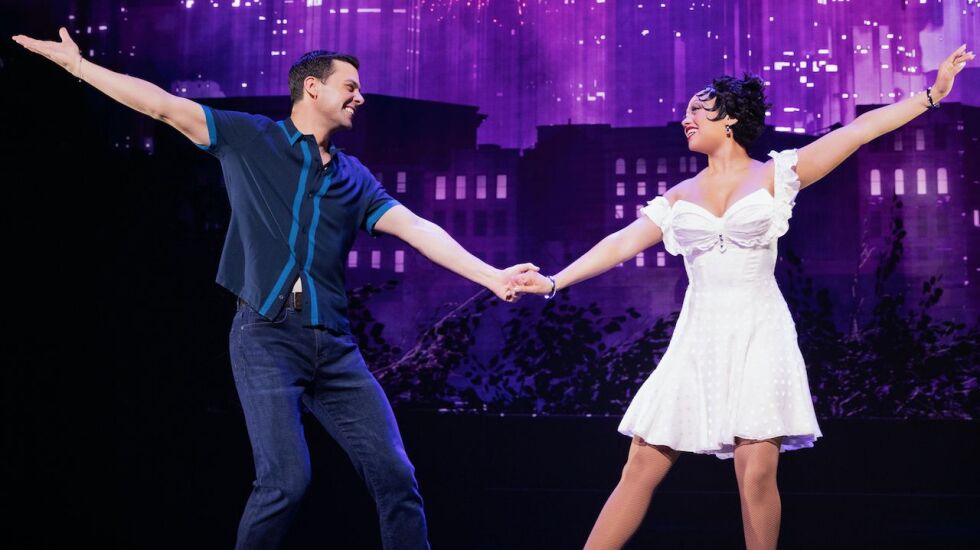
Here’s what doesn’t need to change about “Boop!,” the new musical getting its pre-Broadway tryout at Chicago’s CIBC Theatre this month:
- A single step of director/choreographer Jerry Mitchell’s spectacular footwork.
- A single note in David Foster’s score.
- The gorgeous gray-scale cartoon world that shimmers like silk as it unspools on stage with lush, cinematic detail.
Under Mitchell’s occasionally frenetic direction, “Boop!” offers a lovingly detailed homage to cartoonist Max Fleischer’s iconic pin-curled, squeaky-voiced creation Betty Boop, as well as one spectacular number after another.
Think the Nicholas Brothers meet the Ziegfeld Follies meet the Rockettes and you get an idea of extraordinary athleticism, precision, grace and sheer show-stoppery Mitchell puts on stage.
But while “Boop!” looks and sounds terrific, the plot purportedly driving the show is an overstuffed mess that defies logic, even for a story about a cartoon. It also treats its supporting characters like afterthoughts, which makes the subplots forgettable at best, laborious more often.
“Boop!” boasts not one but two love stories, one wholly unnecessary. There is also a smarmy politician and an imperiled universe that only Betty can save. As scenes veer between Betty’s home in the black-and-white world of cartoons and the technicolor “real world,” Bob Martin’s book winds itself in knots creating and easily solving every last issue with predictable facility.
A quick word about the show’s heroine: Betty Boop made her debut in 1930, Fleischer’s voluptuous pen-and-ink creation becoming the star of many black-and-white movie “shorts.” Betty’s unapologetic mix of blatant sex appeal, smarts and unconventional adventures — she even ran for president in one of her cartoons — made her a star. More than 90 years after Betty Boop’s screen premiere, she’s almost a cult figure, her likeness found in everything from earpods to talking dolls.
“Boop!,” which was created “in association with Fleischer Studios and based on characters Fleischer created,” has an absolute triple-threat star with Jasmine Amy Rogers in the title role.
The story kicks off as Betty leaves her cartoon world, determined to find out who she really is, minus the outward trappings of fame and endless adventures that come with being a cartoon movie star. To travel from her cartoon world home to the real world, Betty borrows a contraption her Grampy (Stephen DeRosa) invented. Like the DeLorean in “Back to the Future,” it serves as a portal between universes.

Conveniently, the machine (with a massive amount of dazzle and stage smoke) sends Betty to Comicon, a convention of cosplaying animation aficionados. Betty fits right in, and quickly befriends Trisha (Angelica Hale), a Betty Boop superfan who ends up taking Betty home with her. Trisha’s jazz-loving brother Dwayne (Ainsley Anthony Melham) is instantly smitten.
Meanwhile, there’s trouble back in the cartoon world. Without Betty, the entire place and all its cartoon inhabitants will cease to exist. Trouble in the real world ensues when Betty is conned into helping a slimeball politician win a crucial election.
In addition to being convoluted, the plot completely wastes Tony winner Faith Prince, who plays Valentina, a real-world character with enough ribald energy to power an entire burlesque house. Valentina is trapped in a stagnant love story with the cartoon world’s Grampy; Mitchell has both Prince and DeRosa camping it up to 12. Both performers become shrill and strident in a hurry, rendering their potential love story into an overblown series of hardy-har-hars that might momentarily amuse a bored elementary schooler, but few others.
Thankfully, this is Betty Boop’s show, and Rogers’ Betty radiates star wattage even when she’s visible only from the neck up, as she is for the first few refrains of “A Little Versatility,” when her body is rendered in cartoon drawings. Even as little more than a singing head, she steals the stage. When the drawings fall away and Rogers sparkles with full animation, it’s a breathtaking moment.
Foster’s score is filled with riches. Rogers delivers a massive act-one closer with the incandescent, ferociously energetic “Where I Want to Be,” a song that captures that optimistic ebullience that comes from knowing your powers are at full strength and that you’re in precisely the right place at precisely the right time. When she unfurls the 11 o’clock “I Want” song “Something to Shout About,” the melody soars and swells with amplitude enough to fill an amphitheater.
There’s also a tricky duet between Betty and sleazy, skirt-chasing villain Raymond Demarest (a comically suave Erich Bergen). “Take it to the Next Level” has Bergen as a Sinatra-slick crooner as he chases Betty around his desk. When she outwits him with the help of a handy desk lamp, it’s a wonderful moment.
As Betty’s shy love interest, Melham’s Dwayne moves with the floaty, balletic grace of a latter-day Astaire. He’s pure Old Hollywood charm, with a knack for modern-day relatability.

One of the production’s most humorous and self-aware moments arrives as Dwayne is singing his face off in a soaring love song, only to reach an anguished final verse that has him bemoaning the weirdness of falling in love with a drawing.
David Rockwell’s set design and Finn Ross’s projections work wonders on stage. The visuals are stars in their own right, moving the action from black-and-white cartoons to a full-color world with a fluidity that speaks to the artistry and technical prowess of the designers.
Wresting a viable musical from a two-dimensional character whose work peaked in the 1930s is a mighty challenge. Mitchell is part of the way there. “Boop!” looks and sounds great. If its creators can come up with a plot that’s more focused and supporting characters with more depth than, well, cartoons, they just might have a hit.







